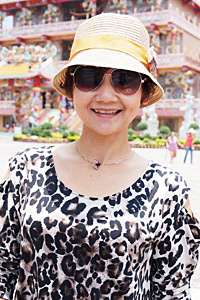I couldn't believe that I hadn't been to the cinema for nearly a year. Blame Covid-19 for putting movie theatres off-limits, leaving us no choice but to entertain ourselves at home. It's no substitute for the pleasure of the big silver screen, but for the sake of my health, I had no choice.
But last week I was finally able to venture into a movie theatre and cheer for Southeast Asia. The occasion was the release of the latest Disney animated movie, Raya and the Last Dragon. I'm not a big fan of animation, but the first warrior princess inspired by Asean culture and people is hard to resist.
Co-written by Malaysia's Adele Lim, who won praise for bringing authenticity and depth to the 2018 hit Crazy Rich Asians, and Vietnamese-American screenwriter Qui Nguyen, the movie draws on Southeast Asian influences to tell a new kind of fantasy story, particularly to Asean women like me.
Raya, which means "celebration" in Bahasa Melayu, features a princess who goes on a quest to find a dragon and reunite the tribes of Kumandra, a land fractured by wars and a plague. Along the way, she learns that it will take not only dragon magic but also trust to save the world. Only by abandoning self-interest and learning to trust one another again can the five quarrelling dragon lands avert impending doom.
The movie takes its visual inspiration from many countries, including Laos, Indonesia, Thailand, Vietnam, Cambodia, Malaysia, Singapore and the Philippines. It's one of the first Disney animated features to be developed by a team spread across countless remote locations because of the pandemic.
You'll recognise many of the voices as A-list stars of Asian descent including Kelly Marie Tran (Star Wars), who voices Raya, Sandra Oh, Awkwafina and Gemma Chan.
The main message in the movie isn't about finding a dragon or recovering gemstones, though that's part of it. Raya tries to bring together different groups of people, who resent and mistrust each other, and encourages them to work together for the common good.
Mr Nguyen, whose parents were refugees who made a better life for themselves, wanted the fight scenes in Raya to reflect martial arts that originated in Southeast Asia. The lone warrior carries a sword inspired by the Indonesian kris. And each land in the film has a different fighting style, such as Indonesian pencak silat, Muay Thai, and Vietnamese vo thuat.
A fan of comic books since he was a kid, Mr Nguyen said he felt a personal connection to Raya. She is a heroine who has lost her friends and family, a refugee from her own land. Instead of giving up, she tries to repair the world.
Western narratives about Southeast Asia, he observes, are usually rooted in trauma and exoticism, and it's time to flip the script. "We're often depicted as the bad guy, the sidekick, or the refugee in a negative context." By contrast, Raya is a story that's "empowering, and gives a big positive message to people that look like us", he told NBC Asian America.
Ms Lim said she wrote the characters to be reflections of women she saw growing up. "Southeast Asia has a strong tradition of female leaders, female warriors and even to this day, Southeast Asian women are incredibly empowered," she said. "So, it made a lot of sense for her to be a princess."
With Disney's first Southeast Asian princess on the screen, we in the region have more reasons to celebrate. Asian filmmaking culture is clearly gaining traction worldwide -- look no further than the inspiring Oscar victory of South Korea's Parasite last year.
One for the Road, a Thai-language drama produced by Hong Kong director and screenwriter Wong Kar-Wai, won the World Dramatic Special Jury Award from the Sundance Film Festival 2021 for Creative Vision in the World Cinema Dramatic Competition.
To me, Raya also offers an opportunity for moviegoers, especially families, to have tough conversations together. Yes, it delivers a cheerful message, but it also tells the story of a broken world. Ultimately, the princess's superpower isn't her strength, it's her empathy.
We are now living in a fractured world, full of divisiveness, fear and hostility, in many cases made worse by the pandemic.
A message about finding trust, coming together to build unity, is unbelievably timely. The Asean community, where Raya's story originated, is no exception.
